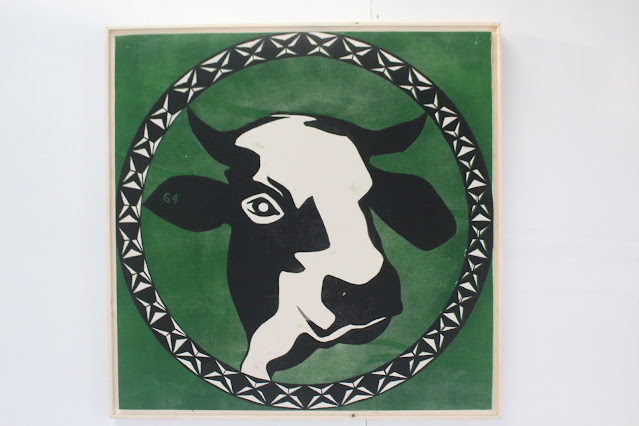By Margaretta wa Gacheru (composed October 14, 2022)
When Abdul
Kiprop made the move from Eldoret to Nairobi, he had no idea that what he would
find was a fascinating career path in the arts that would change the course of
his life.
“I came because
I knew I had things to learn that I wasn’t going to get in Eldoret,” the Egerton
university graduate told BDLife shortly after the Collective’s recent Open
House on October 6th.
But through
friends, he had heard about an artist named Michael Musyoka who was a cofounder
of Brush tu Artists Collective. So, he sought Musyoka out, and the rest, as
they say, is history.
“First came
Thom Ogonga who taught us about woodcut printing. After that, Peterson Kamwathi
shared his knowledge about aquatint [printing], and finally, Wycliffe Opondo
showed us how to do dry-point printing,” says Abdul, remembering the guys who
first opened his eyes to the amazing art of printmaking.
“I also went to Red Hill Gallery and saw some of Jak Katarikawe’s prints which were interesting. I also saw Dennis Muraguri’s woodcut prints first at Circle Art and later at the Nairobi Museum,” adds Abdul, expressing appreciation for all the influences that he has taken to heart.
It has all
been a kind of ‘crash course’ learning experience for him since he first
arrived in Nairobi in 2017. At the same time, he already has a younger
generation of Kenyans asking him to teach them about printmaking.
But the
other major milestone in Abdul’s path to self-discovery was meeting Yony Waite,
the Guam-born Kenyan artist who is based in Lamu at the Wildebeeste Workshop.
In addition to her being a brilliant painter and the co-founder of the now
defunct Gallery Watatu, Yony is a printmaker with a large printing press at her
Workshop.
Abdul has been to Lamu several times since he first went to attend the Lamu Art Festival. Subsequently, he has been twice with his Brush tu artists, once to teach printmaking to orphans at the Anidan Children’s Home, and several times to work at Wildebeeste, learning lots more about the various techniques of printmaking from Yony. “She invited me to an art residency at the Workshop where she let me work with the printing press nonstop,” he says.
Abdul was among
the four Brush tu artists whose works were displayed at the Collective during their
Open Day. Each of the four uses a different type of Ink which is why their exhibition
was called ‘Ink Resonance’. For instance, Peteros Ndunge uses ballpoint ink to
create his meticulously drawn human forms, while Boniface Maina works with acrylic
ink as well as with Wilson & Newton water-resistant ink that he got from James
Mbuthia back when he was running workshops at RaMoMa. And Abdul works with ordinary offset printers ink. “It’s
the main printers ink available in Kenya,” Abdul notes.
But the inks
are only a fraction of what is intriguing about his prints. What’s of greater
interest is that he exhibited large woodcut prints on canvas during Brush tu’s
recent open house.
“This was
the first time I have printed on canvas. I printed them with the press that I made
myself,” he says, adding that he is in the process of making a second printing
press for Brush tu artists to use. The first one he made with his own hands is
up in his Eldoret studio.
Asking him where he learned to build a printing press and why, Abdul says he studied the construction of Yony’s press in Lamu and figured out how it was built. “Then I went and learned welding skills from Kimani Ngaru,” one of the Brush tu artists and a former principal at Buru Buru Institute of Fine Art.
The reason
why he has begun building presses of his own is most likely because he got ‘spoiled’
spending so much time with Yony’s press that he doesn’t want to be without one
of his own.
So, from the
look of things, there is little doubt that Abdul is hooked on printmaking. It
has become a passion and the purpose that this artist was looking for.






No comments:
Post a Comment